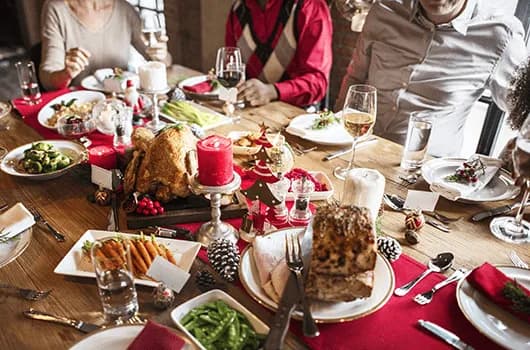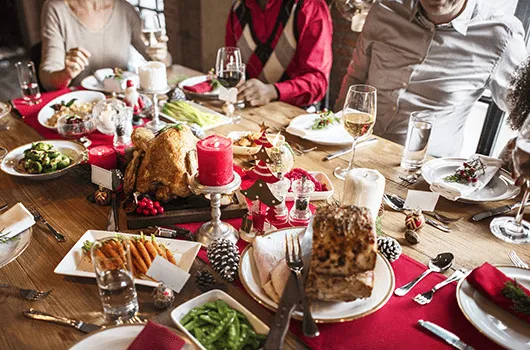
Ready to Start Your Wellness Journey?
Become a Herbalife Preferred Member and enjoy exclusive discounts of up to 25% on all products.
BECOME A PREFERRED MEMBERHow to Avoid Weight Gain This Holiday

It’s possible, if not likely, to pack on five pounds between now and January––and it’s easier than you might think. Most people only add a pound or two over the holidays. But when you look at what a few extra indulgences can cost you, the calories add up fast. Gaining five pounds before the New Year would mean taking in an extra 17,500 calories or so between now and January. If that sounds like a lot, you’re right. Here’s how sliding down the slippery slope of holiday weight gain can happen.
First, we’ll turn back the clock to October 31. The average Halloween bucket holds about 250 pieces of candy at about 35 calories each. If you’re like most people, you bought too much, so you may have put away a couple of pieces a day for a few weeks. That would have given you a 1000 calorie head start.
Going forward, we come to Thanksgiving. We’re no longer content with just Thanksgiving Dinner––we’ve morphed the holiday into Thanksgiving Day, since we spend a good part of the day eating. Many people plan the main event early in the day––it makes it that much easier to squeeze in a repeat performance later in the evening. Total calories for the day could easily top 5000 or more. Conservatively, that’s about 2500 more than the average person needs.
Now in the thick of it, your workplace sometimes can be your undoing during the holidays. Grateful customers and clients, or even coworkers, flood the office with cookies, candies and tins of caramel popcorn. If you eat two handfuls of caramel popcorn three days a week for a month (2200 calories), and three pieces of chocolate candy a week for a month (1600), you could gain a pound by January.
You’re bound to have more goodies at home, too, when the gift baskets start to arrive. You could easily eat 10 mini muffins over the course of a few days (1000 calories), or make a few dives into the salami and cheese crackers (700 calories). Bake a couple batches of holiday cookies or gingerbread and you’ll be in trouble, too. An extra 6 cookies (and a few samples of cookie dough) could set you back another 500 calories or so.
Now throw some cocktail parties into the mix. Hors d’oeuvres are little calorie bombs, averaging about 100 calories each, and some alcoholic drinks, like sweet martinis, can easily top 300 calories. Two parties = two thousand calories = two-thirds of a pound. Tack on what you’ll get from a couple of potato pancakes and some beef brisket at a Hanukkah party (1000 calories) and could be almost another pound up.
It shouldn’t be hard to pick up the remaining 5000 calories or so, especially when you’re faced with foods like pecan pie (500 calories a slice), prime rib (800 calories for 8 ounces) and creamy artichoke dip (600 calories in a half cup). And then Christmas brunch might consist of a slice of quiche (500 calories), a giant cinnamon roll (500) and a cup of eggnog (400).
Finally, it’s likely that you could couple all this eating with a bout of inactivity. If you give up your daily 45 minute walks (175 calories) until New Year’s Day, you’ll be facing your next weigh-in with a sense of dread.
Want to avoid ‘sticker shock’ when you step on the scale in January? Here are some tips that will help.
- Do your best to stick to your usual eating and exercise patterns, rather than using the holiday season to let yourself go.
- Avoid going to holiday get-togethers with an empty stomach. Have a substantial snack in the mid-afternoon before heading out for dinner parties and buffets.
- Watch your alcohol calories. Try alternating an alcoholic beverage with a calorie-free beverage to reduce your overall intake. If you don’t feel sociable without a drink in your hand, a glass of sparkling mineral water with a slice of lime or lemon will do the trick.
- You don’t need to avoid holiday treats entirely, but save your calories for the special items that you only eat once a year. And steer clear of the ‘everyday’ treats that you could eat any time.
- Holidays can be stressful, which can lead to stress eating. Take time to rest and recharge. When stress is urging you to eat, have a soothing cup of tea or take a walk or jog instead.
- Focus on all the positives that come with celebrating the holidays, and use that perspective to strengthen your commitment to your diet and exercise plan.
Susan Bowerman, MS, RD, CSSD, FAND – Director, Worldwide Nutrition Education and Training
Ready to Start Your Wellness Journey?
Become a Herbalife Preferred Member and enjoy exclusive discounts of up to 25% on all products.
BECOME A PREFERRED MEMBER